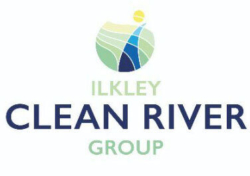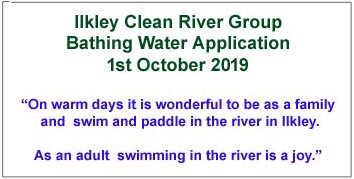So what is bathing status?
When designation is granted, it triggers four important actions that will help Ilkley secure a clean river:
(1) Regular testing of water quality by the Environment Agency to determine if it is safe to paddle, play and swim in.
(2) Signage indicating if the water is clean enough to paddle, play or swim in.
(3) A management plan for the river so that there are the facilities for the people who already visit to paddle swim and play in the river and on the riverbank
Longer term:
(4) A full investigation of the sources of pollution in the river, and the subsequent implementation of a solution to clean up the river.
Ilkley is a popular spot for the public to picnic, and enjoy the river. During the summers of 2019 and 2020 there are days where 1000+ people were counted by the Group paddling, playing, swimming and using the riverbank, with numbers reaching 1750 on one day.
Designation is not intended to attract more people at the river, but to monitor public health and ensure that the river does not put peoples’ health at risk when they do visit and that the local environment is better managed .
The Ilkley Clean River group has been investigating the pollution which comes from storm overflows upstream of Ilkley, with high levels of E-coli from sewage in the river when it rains. At the area where local young people tend to congregate near the sewage works, pollution is at a level where it is never safe to go in the water.
Designation will shine a spotlight on the sewage pollution in the river at Ilkley, and would be a step forward in secure the investment and infrastructure to treat raw sewage rather than discharge it straight into the river. In 2019 there were 114 days when raw sewage was discharged into the river.
Yorkshire Water has already committed to investigating the sewage issue in Ilkley and upgrading the infrastructure in Ilkley committing to a 20% reduction in storm overflows.
This will not affect household bills. Yorkshire Water is already paying millions in dividends to shareholders whilst Ilkley Clean River group campaigns for these ‘profits’ to be reinvested in our outdated and poorly maintained sewage system. Our bills should have been going to treat the sewage not to provide profit. Ofwat regulates our bills and is not supporting an increase.
Local Engagement
Ilkley Clean River Group (a group of Ilkley residents) held three Town Meetings over a 1 year period with 300 people attending where we provided all the data about the quality of the water in the river. We also provided an online survey with 527 people responding in support. 50 volunteers took part in water testing and counting people at the river. Despite this we have to take part in another consultation from Defra.
Our Bathing Status application was supported by:
-
Our local MP
-
The Town Council
-
Bradford Council
-
527 Ilkley residents surveyed, and the people at the Town Meetings.
Will Bathing Status attract more people?
If we get bathing status signs will have to go up saying whether the water is clean enough for people to let their kids paddle in it. Currently its not safe every time it rains and for some hours (possibly days) after, and it’s never safe under any conditions downstream of the footbridge. This is because bathing status triggers regular testing of the water in Ilkley. It could be that those signs put people off as currently people don’t know its polluted.
There are mixed views in the town, some residents welcoming visitors to the town and some concerned after the recent post lockdown anti-social behaviour. The Bathing Status Application is based on the people who have been using the river for years. Post -Lockdown all open spaces experienced anti-social behaviour .
If we get Bathing Status there are many other rivers ready to submit applications. This mean we will be the first of many across the UK and it will become the ‘norm’ for rivers to be properly monitored and managed for bathing (paddling, playing)
Does more people mean more disruption?
The Bathing Status triggers the requirement for Bradford Council to put in a management plan for the river. This would be to manage the site for bathing. It is currently not managed for bathing hence a lot of our difficulties when it’s crowded. This would be a real benefit to the town. It would also mean addressing facilities issues such as toilets. The Bathing Status helps us manage the people who are already coming to the area, to the benefit of all of us.
Why do we have to do this? Surely Yorkshire Water shouldn’t put raw sewage in the river? Don’t we pay for our sewage to be treated?
Yorkshire Water is acting legally in dumping raw sewage in the river when it rains. They are allowed to do so as soon as the ‘inflow’ into the sewage works gets over capacity, which is currently every time it rains. This was 114 days in 2019. We have challenged the legality of this but the Environment Agency is defending their position. The UK is currently non-compliant with European Legislation on this since 2011. We have also tried to get the ‘limit’ raised but the Environment Agency insists that water quality is good so there is no need. EA monitoring is designed to detect water quality problems that cause damage to wildlife not health hazards for people.
With Bathing Status the state of the river will be monitored and public. This pressures Yorkshire Water to sort out our infrastructure. Currently they are planning to get all the rainwater straight into the river so that its not mixing with our household waste. If they do that the sewage works can probably cope with all our sewage and treat it all. This is called ‘de-combining’ the sewage system. Currently rainwater and household waste all combines in one sewer and goes into the sewage works together.
How bad is the water quality?
We have tested the E-Coli (sewage pollution) at Ilkley and you can see our results here
In dry weather it is safe to paddle, play and swim upstream of the footbridge. It is not safe to paddle, play ro swim there when it is raining or there has been recent rain. It is never safe to paddle, play or swim below the footbridge all the way to Beanland’s or downstream at Burley. The levels of E-Coli are 40-50 times (40x in dry weather, 50x in wet weather) the level that is safe for getting in the water. The water here is always a public health hazard.
We have been campaigning for Yorkshire Water to put up signs to say the river is polluted and a danger to public health but so far they haven’t done so.
We have known for a year that this is unsafe but no-one is taking any notice, that’s why we are campaigning for bathing status.
Will our bills go up?
No. Ofwat is already trying to reduce our bills by 1%, and is requiring Yorkshire Water to put in place improvements without price rises.
Yorkshire water has committed to finding a proper solution in Ilkley if we get designation.
Yorkshire Water’s operating profit in 2018-19 was £263.9 million. Dividends go to the shareholders . The previous CEO Richard Flint was paid £932,000 in 2018. Shareholders took £412 million in profits between 2013-2017
Yorkshire paid out £168.4m in the past couple of years with £107m of it to service inter-company debts.
26% of the holding company Kelda is owned by GIC Special Investments, a sovereign wealth fund owned by the government of Singapore.
Ofwat is requiring a reduction in bills of 1% for 2020-25.
Our application to DEFRA and its interpretation by the Environment Agency (EA) appears to be somewhat in conflict…
Video setting out the problems with our designation area

